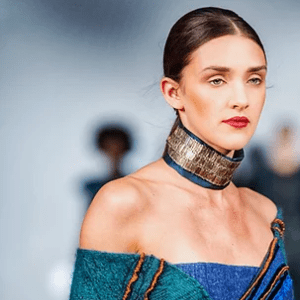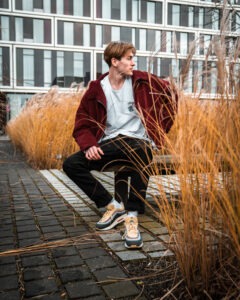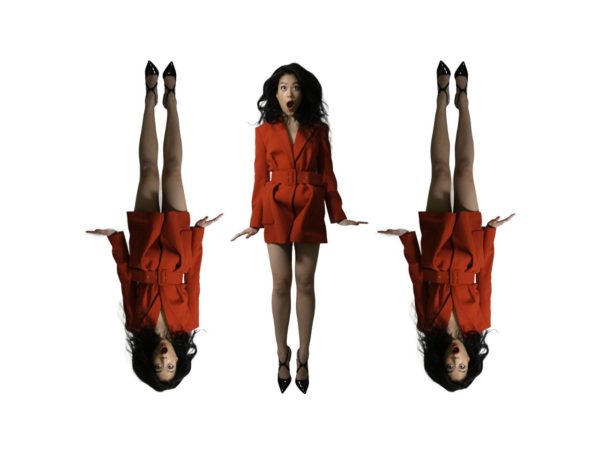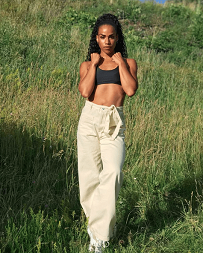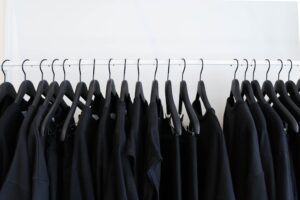Table of Contents
Fashion Week is the embodiment of glitz and glamour, captivating the world with cutting-edge trends. More recently, awareness of the fashion industry’s impact on the environment has grown, putting pressure on Fashion Week to take ownership of its environmental footprint. From the 2019 Extinction Rebellion protest calling for the cancellation of London Fashion week, to Copenhagen’s Fashion Week Sustainability action plan, brands are feeling the pressure to rethink their role in the fashion industry. With the climate crisis at hand, more eco-conscious designers are rising up and standing out for their transparent supply chains, traceability and artisanal care in their craft. The industry still has a long way to go, but if this year has shown anything, the sustainable fashion world has a lot to offer.
Historically the largest source of emissions has been the gathering of designers, reporters, fashion connoisseurs and models in the fashion capitals to see the latest designs. The Covid-19 pandemic forced major changes, the greatest being the push for virtual shows, ultimately making this the most emissions friendly Fashion week yet! The success of these virtual shows might just be the push the industry needed to rethink strategies and develop more sustainable business models. The positive outcome is already noticeable with Gucci, Burberry and Prada pledging to reduce their environmental footprint, and work towards carbon neutral supply chains. Gucci just published plans to partner with the UN’s Redd+ program which endorses strong reforestation efforts, and this year, Copenhagen Fashion Week released their first sustainability report outlining plans to be zero-waste by 2022.
Historically the largest source of emissions has been the gathering of designers, reporters, fashion connoisseurs and models in the fashion capitals to see the latest designs. The Covid-19 pandemic forced major changes, the greatest being the push for virtual shows, ultimately making this the most emissions friendly Fashion week yet! The success of these virtual shows might just be the push the industry needed to rethink strategies and develop more sustainable business models. The positive outcome is already noticeable with Gucci, Burberry and Prada pledging to reduce their environmental footprint, and work towards carbon neutral supply chains. Gucci just published plans to partner with the UN’s Redd+ program which endorses strong reforestation efforts, and this year, Copenhagen Fashion Week released their first sustainability report outlining plans to be zero-waste by 2022.
At this point it would seem hypocritical for fashion companies not to address climate change, and with the sustainable fashion industry growing, well-established large brands have choices to make. What is clear is that for an entirely new generation of designers and companies, sustainability is second nature.
Arguably, Copenhagen’s sustainability report should be an inspiration to all Fashion Week shows. It calls on companies to reduce their footprints, avoid burning unsold clothes, use recycled textiles and sustainable packaging. Sustainable Fashion Week showcases possibilities with upcycled collections, using clothes from previous years or teaming up with companies like Reskinned, to use waste fabric. Other options include only using ethically-sourced materials and choosing not to produce seasonal collections. Wardrobe collections are also smaller, replaced with the resale of previous seasons. Additionally, brands are publishing their social practices, creating new levels of trust between them and sustainability-conscious consumers. At this point it would seem hypocritical for fashion companies not to address climate change, and with the sustainable fashion industry growing, well-established large brands have choices to make. What is clear is that for an entirely new generation of designers and companies, sustainability is second nature.
Luxury and sustainability haven’t always gone hand in hand, but some of these brands are paving the way for a new age of fashion. Virtual shows have also leveled out the playing field allowing smaller designers to be better seen and heard. Here are some luxury and up and coming brands working towards sustainability in their business practices.
Luxury and sustainability haven’t always gone hand in hand, but some of these brands are paving the way for a new age of fashion. Virtual shows have also leveled out the playing field allowing smaller designers to be better seen and heard. Here are some luxury and up and coming brands working towards sustainability in their business practices.
Luxury brands to keep your eye on:
The first on the list is Stella McCartney, the first vegetarian luxury label in the world, bringing environmentally conscious high fashion to the catwalk proving that luxury clothing can be created through sustainable practices.
Phoebe English has been a pioneer in decarbonizing clothes-making, in a dynamic and collaborative way. Her newest collection is focused on upcycling deadstock fabric and using natural dyes so as not to pollute waterways. Her motivation being that shipping in sustainable fabrics wasn’t actually sustainable and using deadtock gave new life to her newest monochrome collection.
Temperley London, a British brand, is continuously striving towards sustainability throughout all of their collections. The brand uses fabrics derived from natural fibers that are biodegradable, focusing on having minimal waste, and using deadstock from previous seasons. They have a strong focus on ethical supply chains, working closely with all of their suppliers.
Gabriella Hearst began shifting her collections towards sustainability in 2015 continuing on from her carbon-neutral fashion show in 2019 to her AW’20 collection which showcased a sustainable collection made entirely of waste. Gabriella has found a beautiful way of repurposing looks and textiles, such as a trench coat made from remnants of a Turkish kilim.
Jade Sarita Arnott , a Melbourne and New York-based label brings eco-friendly textiles like organic cotton, help and Tencel to her feminine pieces. Arnott focuses on having minimal waste and has transparency throughout the supply chain.
Farzaneh H. Christensen is a sustainable brand that believes fashion should promote positive messages about ethical practices. Luxury is not compromised with this brand, showing how quality and sustainability can go hand in hand. Their manufacturing is plastic free and focuses on reducing their footprint.
Phoebe English has been a pioneer in decarbonizing clothes-making, in a dynamic and collaborative way. Her newest collection is focused on upcycling deadstock fabric and using natural dyes so as not to pollute waterways. Her motivation being that shipping in sustainable fabrics wasn’t actually sustainable and using deadtock gave new life to her newest monochrome collection.
Temperley London, a British brand, is continuously striving towards sustainability throughout all of their collections. The brand uses fabrics derived from natural fibers that are biodegradable, focusing on having minimal waste, and using deadstock from previous seasons. They have a strong focus on ethical supply chains, working closely with all of their suppliers.
Gabriella Hearst began shifting her collections towards sustainability in 2015 continuing on from her carbon-neutral fashion show in 2019 to her AW’20 collection which showcased a sustainable collection made entirely of waste. Gabriella has found a beautiful way of repurposing looks and textiles, such as a trench coat made from remnants of a Turkish kilim.
Jade Sarita Arnott , a Melbourne and New York-based label brings eco-friendly textiles like organic cotton, help and Tencel to her feminine pieces. Arnott focuses on having minimal waste and has transparency throughout the supply chain.
Farzaneh H. Christensen is a sustainable brand that believes fashion should promote positive messages about ethical practices. Luxury is not compromised with this brand, showing how quality and sustainability can go hand in hand. Their manufacturing is plastic free and focuses on reducing their footprint.
Other up-and-coming brands:
Priya Ahluwalia, a joint winner of the LVMH Prize, is a designer to watch. She is British with an Indian mother and Nigerian father who have been the inspiration behind her menswear. She has fused sportswear with her heritage, using repurposed deadstock and vintage pieces. She just unveiled her SS21 collection during the London Fashion Week.
Sézane is a French fashion brand with an eco-conscious business model. The brand resells archived pieces or upcycled pieces from fabrics and leathers. Up till now they have upcycled more than 10,000 pieces. The brand also only uses recycled packaging and eco-friendly dyes and tanning methods.
Last, but certainly not least is Jungle Folk, a Swiss brand that is creating social change through business. They have direct relationships with artisans in Latin American, to create timeless pieces for women made from recycled and certified materials.

